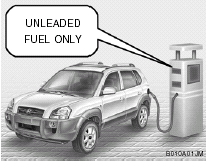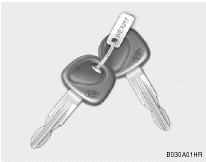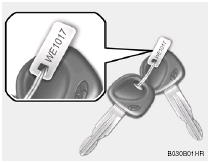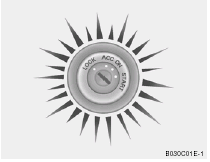Hyundai Tucson: Fuel recommendations
Use Unleaded Gasoline

Unleaded gasoline with a Pump Octane Rating of 87 (Research Octane Number 91) or higher must be used in your Hyundai.
WARNING:
o Do not "top off" after the nozzle automatically
shuts off when refueling.
o Tighten the cap until it clicks, otherwise
the " " light will illuminate.
o Always check that the fuel cap is installed
securely to prevent fuel spillage
in the event of an accident.
" light will illuminate.
o Always check that the fuel cap is installed
securely to prevent fuel spillage
in the event of an accident.
What About Gasohol?
Gasohol (a mixture of 90% unleaded gasoline and 10% ethanol or grain alcohol) may be used in your Hyundai. However, if your engine develops driveability problems, the use of 100% unleaded gasoline is recommended. Fuels with unspecified quantities of alcohol, or alcohols other than ethanol, should not be used.
Use of MTBE
Hyundai recommends that fuels containing MTBE (Methyl Tertiary Butyl Ether) over 15.0% vol. (Oxygen Content 2.7% weight) should not be used in your Hyundai. Fuel containing MTBE over 15.0% vol. (Oxygen Content 2.7% weight) may reduce vehicle performance and produce vapor lock or hard starting.
Do Not Use Methanol
Fuels containing methanol (wood alcohol) should not be used in your Hyundai. This type of fuel can reduce vehicle performance and damage components of the fuel system.
CAUTION: Your Hyundai's New Vehicle Limited Warranty may not cover damage to the fuel system and any performance problems that are caused by the use of fuels containing methanol or fuels containing MTBE (Methyl Tertiary Butyl Ether) over 15.0% vol. (Oxygen Content 2.7% weight.)
Gasolines for Cleaner Air
To help contribute to cleaner air, Hyundai recommends that you use gasolines treated with detergent additives, which help prevent deposit formation in the engine. These gasolines will help the engine run cleaner and enhance performance of the Emission Control System.
Operation in Foreign Countries
If you are going to drive your Hyundai in another country, be sure to: o Observe all regulations regarding registration and insurance. o Determine that acceptable fuel is available.
Breaking in your new Hyundai
No formal "break-in" procedure is required with your new Hyundai. However, you can contribute to the economical operation and durability of your Hyundai by observing the following recommendations during the first 1,200 miles (2,000 km).
o Don't drive faster than 55 MPH (88 km/h). o While driving, keep your engine speed (rpm, or revolutions per minute) between 2,000 rpm and 4,000 rpm. o Use moderate acceleration. Don't start quickly or depress the accelerator pedal fully. o For the first 200 miles (300 km), try to avoid hard stops. o Don't lug the engine (in other words, don't drive so slowly in too high a gear that the engine "bucks"-shift to a lower gear). o Whether going fast or slow, vary your speed from time to time. o Don't let the engine idle longer than 3 minutes at one time. o Don't tow a trailer during the first 1,200 miles (2,000 km) of operation.
Keys

For greater convenience, the same key operates all the locks in your Hyundai. However, because the doors can be locked without a key, carrying a spare key is recommended in case you accidentally lock one key inside the car.
Record Your Key Number

A code number is stamped on the number plate that came with the keys to your Hyundai. This key number plate should not be left with the keys but kept in a safe place, not in the vehicle. The key number should also be recorded in a place where it can be found in an emergency. If you need additional keys, or if you should lose your keys, your authorized Hyundai dealer can make new keys if you can supply the key number.
ILLUMINATED IGNITION SWITCH (If installed)

Whenever either front door is opened, the ignition switch will be illuminated for your convenience, provided the ignition switch is not in the "ON" position. The light will go off approximately 10 seconds after closing the door or when the ignition switch is turned on.
See also:
When traveling or registering your vehicle in another country
When planning to travel in another country,
you should first find out if the fuel available is
suitable for your vehicle’s engine.
Using fuel with an octane rating that is too low
may cause engine damage. All gasoline vehicles
must be oper ...
Jump Starting Instructions
WARNING:
• Never attempt to jump start your vehicle if the battery appears to be frozen.
Batteries in this condition may explode or rupture if jump starting is attempted.
• When making jumper cable connections, be certain that your hands ...

 Indicator symbols on the instrument panel
Indicator symbols on the instrument panel